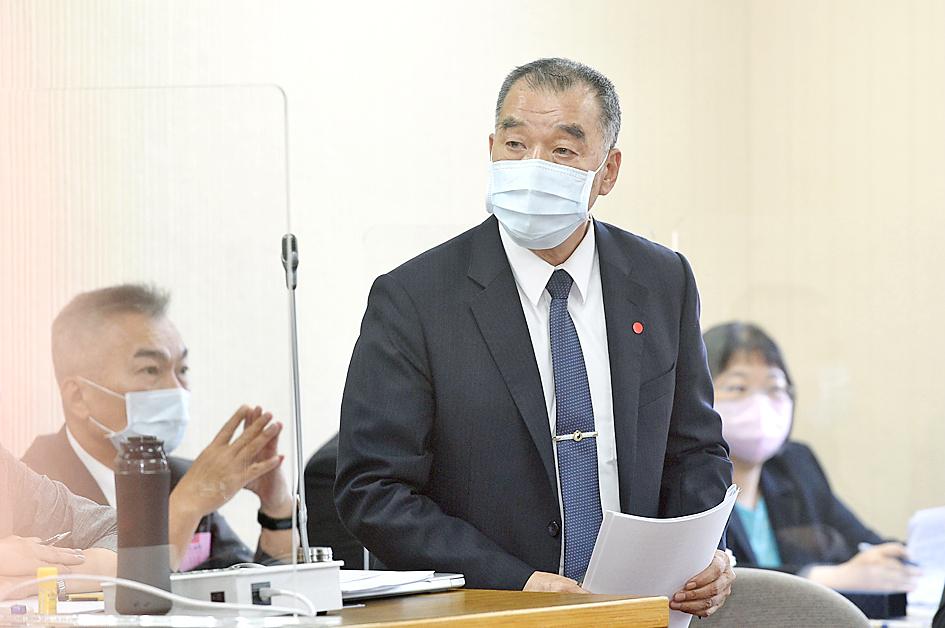Military tensions with China are at their worst in more than 40 years, Minister of National Defense Chiu Kuo-cheng (邱國正) said yesterday, days after record numbers of incursions by Chinese aircraft into Taiwan’s air defense identification zone (ADIZ).
Tensions have hit a new high between Taipei and Beijing, and the Chinese People’s Liberation Army (PLA) aircraft have repeatedly flown through Taiwan’s ADIZ.
Over a four-day period beginning on Friday, Taiwan said that nearly 150 PLA military aircraft entered its ADIZ, part of a pattern of what Taipei calls Beijing’s continued harassment of the nation.

Photo: George Tsorng, Taipei Times
At a meeting of the Legislative Yuan’s Foreign Affairs and National Defense Committee yesterday, Chinese Nationalist Party (KMT) Legislator William Tseng (曾銘宗) asked Chiu about current military tensions with China and whether he agreed with a May report in The Economist, which said that Taiwan is the “most dangerous place on Earth.”
That is just the opinion of the foreign media, but the situation is the “most serious” in the more than 40 years since he joined the military, Chiu said.
“For me as a military man, the urgency is right in front of me,” he said.
China has the ability to invade Taiwan and its military would have the capability of mounting a “full scale” invasion by 2025, Chiu added.
“By 2025, China will bring the cost and attrition to its lowest. It has the capacity now, but it will not start a war easily, having to take many other things into consideration,” he told the committee which, with the legislature’s Finance Committee, is reviewing a special military purchase act of NT$240 billion (US$8.6 billion) for indigenous weapons, including missiles and warships.
In response to Democratic Progressive Party Legislator Michelle Lin’s (林楚茵) queries about the guiding principle behind Taiwan’s military reactions, Chiu said: “Our military holds to the principle that we will not fire the first shot.”
Taiwanese pilots are under great duress because of this policy, he said, adding that he has visited air bases multiple times to encourage the pilots and told officers that they need to interact more with their troops.
A source has said on condition of anonymity that the Foreign Affairs and National Defense Committee has arranged two classified visits for its members: one to the Chungshan Institute of Science and Technology to tour its manufacturing facility and another to the Hai Feng Brigade to inspect missiles.
The military had placed the Hsiung Sheng missile on public display and it was the first time that the legislators had seen it, the source said.
The lawmakers’ confidence in Taiwan’s defensive capabilities grew after learning that the Hsiung Feng IIE (Brave Wind) has a range of 600km, while the Hsiung Sheng cruise missile has a range of more than 1,000km, the source added.
The purchase act is likely to include the purchase of more than 100 Hsiung Sheng missiles, which would greatly augment Taiwan’s ability to deter China, the source said.

ACTION PLAN: Taiwan would expand procurement from the US and encourage more companies to invest in the US to deepen bilateral cooperation, Lai said The government would not impose reciprocal tariffs in retaliation against US levies, President William Lai (賴清德) said yesterday, as he announced five strategies to address the issue, including pledging to increase Taiwanese companies’ investments in the US. Lai has in the past few days met with administrative and national security officials, as well as representatives from various industries, to explore countermeasures after US President Donald Trump on Wednesday last week announced a 32 percent duty on Taiwanese imports. In a video released yesterday evening, Lai said that Taiwan would not retaliate against the US with higher tariffs and Taiwanese companies’ commitments to

‘SPECIAL CHANNEL’: Taipei’s most important tasks are to stabilize industries affected by Trump’s trade tariffs and keep negotiations with Washington open, a source said National Security Council Secretary-General Joseph Wu (吳釗燮) arrived in the US for talks with US President Donald Trump’s administration, a source familiar with the matter said on Friday. Wu was leading a delegation for a meeting known as the “special channel,” the Financial Times reported earlier. It marked Trump’s first use of the channel since returning to the White House on Jan. 20. Citing a source familiar with the matter, the Financial Times reported that Minister of Foreign Affairs Lin Chia-lung (林佳龍) was also a part of the delegation. The visit came days after China concluded war games around Taiwan and amid Trump’s

CHIP EXCEPTION: An official said that an exception for Taiwanese semiconductors would have a limited effect, as most are packaged in third nations before being sold The Executive Yuan yesterday decried US President Donald Trump’s 32 percent tariff on Taiwanese goods announced hours earlier as “unfair,” saying it would lodge a representation with Washington. The Cabinet in a statement described the pledged US tariffs, expected to take effect on Wednesday next week, as “deeply unreasonable” and “highly regrettable.” Cabinet spokeswoman Michelle Lee (李慧芝) said that the government would “lodge a solemn representation” with the US Trade Representative and continue negotiating with Washington to “ensure the interests of our nation and industries.” Trump at a news conference in Washington on Wednesday announced a 10 percent baseline tariff on most goods

Intelligence agents have recorded 510,000 instances of “controversial information” being spread online by the Chinese Communist Party (CCP) so far this year, the National Security Bureau (NSB) said in a report yesterday, as it warned of artificial intelligence (AI) being employed to generate destabilizing misinformation. The bureau submitted a written report to the Legislative Yuan in preparation for National Security Bureau Director-General Tsai Ming-yen’s (蔡明彥) appearance before the Foreign Affairs and National Defense Committee today. The CCP has been using cognitive warfare to divide Taiwanese society by commenting on controversial issues such as Taiwan Semiconductor Manufacturing Co’s (TSMC, 台積電) investments in the